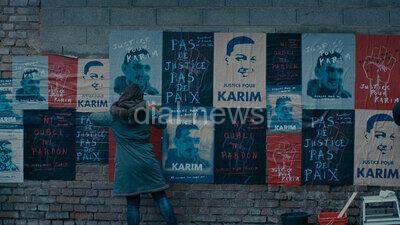The family wants to bury Karim’s body as soon as possible, but they have to wait for the investigation to be done. This gives the movie a personal pain that works on a larger scale as the family navigates this unfathomable stress. Brother Driss (Sofiane Zermani) becomes more aggressive to the police, making him a target, while the younger sister, Nour (Sonia Faidi), watches it all with hesitation. Especially in Jordana’s brilliant performance, you can see the wear this enacts on someone, regardless of the public fervor. If the family decides to give up, they let down activists; if they keep pushing against the police in the media, such corrupt adversaries could topple onto them.
Mikri’s filmmaking is brilliant and charged, and so savvy about depicting an unfathomable experience. When Malika hears her brother will die soon at the hospital, she tries to get inside. A crowd is already building, one of many that will rally around her family but also bring their destructive intensity to such an injustice. When the news of his passing arrives at that moment, the camera shows her face and her devastating reaction just long enough before the shouting crowd takes over the attention. Mikri then depicts the riots that follow with a slow drone shot over the Strasbourg neighborhoods now packed with fire and fighting.
“After the Fire” is full of such touches and emotional acuity, and it doesn’t lose that savviness as its story twists and embraces gray areas. But throughout, the movie maintains an allegiance to the family’s POV. “After the Fire” illuminates the stories of the mourning families who need privacy, but whose pain and sacrifice become, unfortunately, paramount for justice to be served.

There is a compelling frustration to the muted Iranian film “Achilles,” which features a gripping lead performance by Mirsaeed Molavian. As an orthotist at a malnourished hospital, he picks at his giant beard, which is one of the ways he seems to conceal his facial expressions, as much as his fiery eyes reveal his anger. Achilles is his name, and his background on why he is at this hospital, a collection of gray walls and leaky infrastructure, is only slightly doled out by this contemplative script from writer/director Farhad Delaram. But then Achilles meets a woman named Hedieh (Behdokt Valian), who is handcuffed to her hospital bed. She complains about the walls speaking to her. She has been punching them. In time, he also learns of her political prisoner history, and with recent flashes of his own persecution, he decides to help her. Achilles helps her break out of this captivity, their journey only making them more vulnerable to a system they are disillusioned with.

